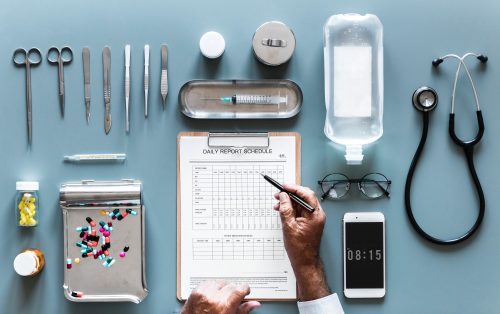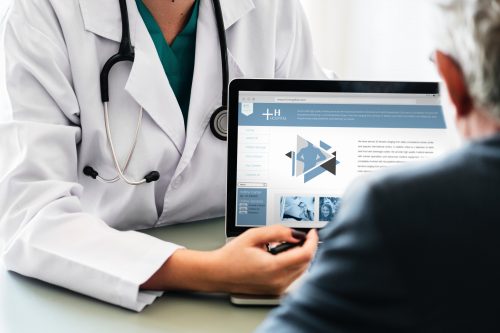Technology has impacted our lives on a larger scale, including our health. From doctors to patients, everyone has adopted the digitization of health industry. And this adoption has given rise to healthcare mobile app development. Undoubtedly, the demand for mobile apps in the healthcare sector is constantly increasing. Medical apps or mhealth apps have brought revolution in the way patients receive care and how patients communicate with providers.

Healthcare mobile apps made patients empowered to take their own, fully-informed medical decisions. It not only provides them with more knowledge but also increases patients’ involvement. Whether it is the healthcare provider or patient, mhealth app developers took the initiative to level the playing field for everyone.
Let’s have a look at how mhealth apps are transforming the healthcare industry.
With the help of mhealth apps, healthcare providers can cater to medical emergencies as well as offer enhance patient care. These apps are slowly becoming a significant part of the patient-provider lifestyle. It comes handy in a lot of medical procedures such as viewing blood reports and medical prescriptions, tracking patient recovery, and monitoring disease symptoms. Digital prescriptions allow providers to treat and monitor patients on the go.
Benefits of Healthcare Mobile Apps
Some of the biggest concerns of patients while accessing healthcare services are the cost of medical and health insurance and keeping pace with the technology. Healthcare mobile app development addresses these concerns and improves patient-provider communication. Even though health is a priority for everyone, but visiting hospitals frequently for regular checkups or follow-ups doesn’t count as a feasible option. Mobile technology brought relief to this problem. Here are some of the benefits of healthcare mobile apps:
- Easy care access: mhealth apps let providers communicate with the patients in a better way. It reduces the distance between them and improves the patient-provider relationship. Mobile apps let patients take consultation over platforms and visit only as recommended. This will not only save patients and providers’ time but also cut a significant cost.
- Improved patient engagement: The long queues outside the doctors’ clinic leaves a very limited time for providers to treat every patient warmly. In addition to this, it lacks the transparency of cost and quality. Healthcare apps work the best for patients, as it informs them if there is any delay in the appointment or they want to fix an appointment in the real time.

Additionally, mhealth apps are beneficial for working professionals and elderly who don’t get updates regarding upcoming doctor appointments or pill schedule. These apps work as an assistant for patients, reminding them to take pills and scheduled appointments as required. - No More Medical Fraud: With healthcare apps, there would be no more Medicare fraud. Often, patients get mislead by brokers present in the hospital who fool them saying that they will fix their appointment and charge a hefty amount to the medical staff. mhealth apps let patients access healthcare services without any mediator. Additionally, patients are also able to book their appointments directly with the doctor through the app and get genuine bills.
- Round the clock service: Healthcare mobile apps offers 24*7 assistance to patients and providers. Generally, when patients are done with consultations, they are left with paper, prescribed medicines, and recommended treatment. This way, there are higher chances that patients may miss the key points mentioned by doctors during treatment.
In such situations, healthcare apps come as a handy solution. It can help patients remember even the minute detail and the important instructions from providers such as taking pills, checking side effects, and contacting a doctor immediately in case of emergency.
Role of mobile apps in the Healthcare Sector
When it comes to healthcare, it becomes mandatory for healthcare providers to make quick decisions and implement those decisions timely to save patients’ lives. An efficient IT infrastructure is necessary for the providers to make prompt decisions. Here healthcare mobile apps can ease-down the decision-making process.
Mobile technology has proven helpful for doctors and nurses. It enables them to check patients’ health records in the real-time and patients can monitor their health conditions too. It also helps policy-makers to further improve as well as create new healthcare programs.
Here are some tips to develop a Successful Healthcare Mobile App

- Determine your target audience: Determining who you are going to provide your services is one of the most crucial factors to consider while developing a healthcare app. Explore as much as you can on your targeted user-base.
- Understand the need/problem: Once you know your target audience, determine what problems they are facing and how can you solve it. There might be many apps available in the market that claim to solve the same problem but hardly people find those appropriate. As a healthcare app developer, you must provide a solution that offers an easy-to-use experience to your users and solves their problems efficiently.
- Customize as required: Your solution should be customized as per patients’ needs. It should provide information to the users, specific to their queries and with which they can relate to.
- Direct Communication: Your healthcare app should offer a direct communication medium between patients and their doctors as it helps patients understand their health state. The medium can be in any form: messages or email.
Earlier, it was necessary for the patients and doctors to be in the same place for the treatment. With the advent of healthcare mobile apps, this limiting requirement has been addressed and solved as patients can take consultation, book appointments and tests, and take proper follow-up virtually within the app. These apps are like a blessing for the people living in rural areas and face difficulty in connecting with professional doctors.
Key Take Away!
As you have learned about how the intervention of technology with healthcare gave rise to healthcare mobile apps, its benefits, and a few tips to build a successful healthcare mobile app. It is evident from the above discussion that the upcoming years are going to be great for the healthcare providers and patients as there will be better solutions and many options to choose from, in order to solve a problem.
Whether it is a patient or a healthcare provider, there are numerous advantages for everyone. If you are thinking about developing your own app then it’s the right time to do it. All you need is a skilled team of an experienced digital healthcare technology partner, medical app developers, and digital marketers.
Editor’s note. This sponsored content was provided by Ritesh Patil.

Ritesh Patil is the co-founder of Mobisoft Infotech that helps startups and enterprises in mobile technology. He loves technology, especially mobile technology. He’s an avid blogger and writes on mobile application. He works in a leading mobile app development company with skilled Android and iOS app developers that has developed innovative mobile applications across various fields such as Finance, Insurance, Health, Entertainment, Productivity, Social Causes, Education and many more and has bagged numerous awards for the same. You can find him on Twitter and LinkedIn.
